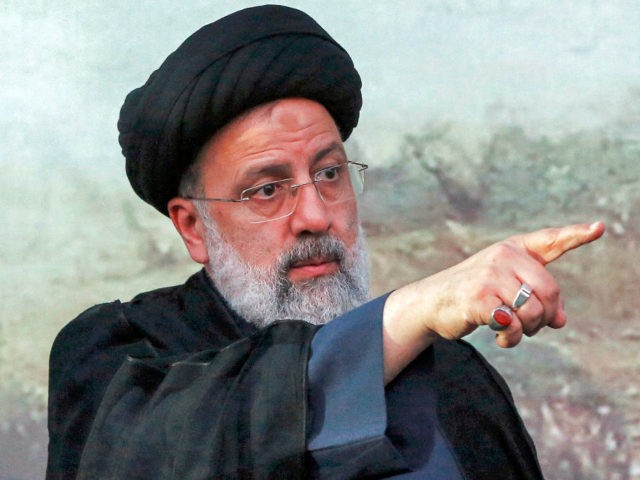The Islamic regime of Iran predictably chose Ebrahim Raisi, a longtime prosecutor responsible for the killing of thousands of dissidents, as its “president” in an election this weekend in which less than half the eligible population participated.
Raisi’s extensive clerical background and record holding several senior judiciary positions, including top prosecutor, contrast significantly with the record of predecessor Hassan Rouhani, which establishment American outlets consider a relative “moderate” at odds with the most extreme Islamist factions in the regime.
While Iran has regularly held presidential elections for decades, Supreme Leader Ayatollah Khamenei typically handpicks the winners through his Guardian Council, which decides who gets their name on the ballot. This year, the Guardian Council rejected 592 candidates filing to run for president, including former President Mahmoud Ahmadinejad, and left seven on the ballot. Three dropped out before election day and endorsed Raisi, leaving him no significant competition in the vote.
The People’s Mojahedin Organization of Iran (PMOI or MEK), the country’s largest and most active dissident organization, urged a nationwide boycott of the election to prevent Khamenei from credibly claiming the election’s results reflected the will of the Iranian people. The campaign appeared to succeed, as over half of eligible voters did not participate, a record low.
The state-run Fars News Agency confirmed late Saturday that 48.8 percent of voters went to the polls, representing about 29 million of the nation’s 59 million eligible voters. Raisi received nearly 18 million of these votes; the closest runner-up, Mohsen Rezaei of the Islamic Revolutionary Guard Corps (IRGC) terrorist organization, received only 3.4 million votes. None of the candidates approved by the Guardian Council represented the alleged “moderate” win of Iranian politics.
Fars News claimed that several polling stations extended their hours to accommodate the large number of people flocking to them to vote. Videos taken by dissidents within Iran show a different story, however — largely abandoned polling places and evidence of government officials allegedly bribing people on the street to go vote.
Evidence suggests that local turnout in major cities fell below the 48-percent nationwide turnout. The Kurdish outlet Rudaw, citing officials in Tehran, reported that the capital city saw a 26-percent turnout in the election, or about 3 million of 10 million votes.
PMOI, the dissident organization, accused the regime of lying about the overall turnout. Claiming evidence compiled from 400 cities nationwide and extensive video evidence of empty polls, PMOI claimed that “less than 10 percent of eligible voters cast their ballots, which displays the Iranian people’s utter contempt for the regime in its entirety.”
The low turnout ran afoul of Khamenei’s personal plea to the Iranian public last week to vote and avoid embarrassing the Islamic regime. Khamenei called voting an “act of virtue” and said Iranian voters could have a “unique impact” on Iran’s international stature if they granted Khamenei a high turnout as a sign of confidence in the regime.
The dissident-led boycott movement made the same case — a low turnout would be an expression of the low levels of support and confidence Iranian people have in their regime and an expression of a desire for change.
“This time around, unlike previous occasions, there [are] no prominent candidates from the regime’s ‘reformist’ faction. That means that the regime has decided to forgo its bogus campaign fervor of previous occasions in favor of consolidating power and further contraction,” Hadi, an Iranian professor active with the resistance, told Breitbart News in an interview last week.
The decision to elevate Raisi to the title of “president” proved particularly noxious to dissidents and international human rights observers due to his extensive record of ordering mass executions of opponents of the Islamic Regime. Raisi’s single most egregious human rights crime was the execution of between 5,000 and 30,000 opponents of the regime, most of them affiliated with the PMOI, in 1988. Raisi held a seat on the Central Committee of the nation’s “death commissions” at the time and held the title of Tehran Deputy Prosecutor — giving him power personally to oversee, order, or cancel the executions.
Anticipating global disgust with his “election,” Raisi, in remarks this weekend, claimed he was a “defender of human rights.” He also vowed to cooperate on the transition with Rouhani and categorically rejected any negotiations with the United States.
Fars News defended Raisi’s record and claimed he had attracted national admiration during previous failed presidential runs.
“He had a strong presence in the struggles leading to the Islamic Revolution and after the victory of the Islamic Revolution, with the election of martyr Ayatollah Beheshti as the judiciary chief he entered the judiciary of the Islamic Republic,” the outlet said of the new president. “Rayeesi gained a high degree of trust and popularity in the public opinion with a deep understanding of the demands of the people, which had peaked since the economic turmoil of 2018, and dealing widely and openly with economic corruption and major corruptors inside and outside the Judiciary, regardless of political affiliations.”

COMMENTS
Please let us know if you're having issues with commenting.